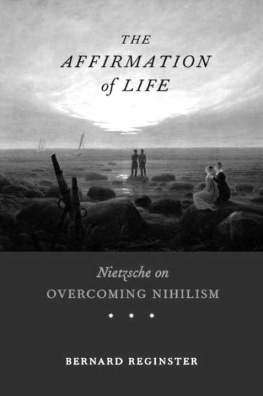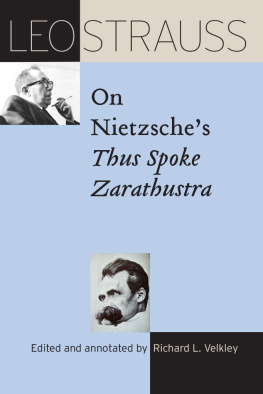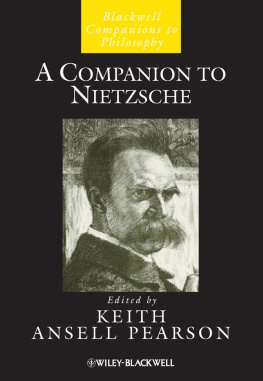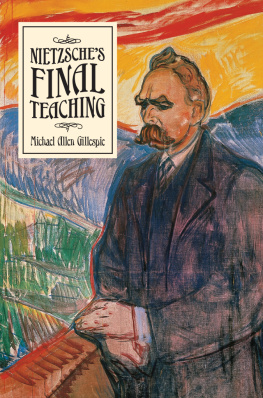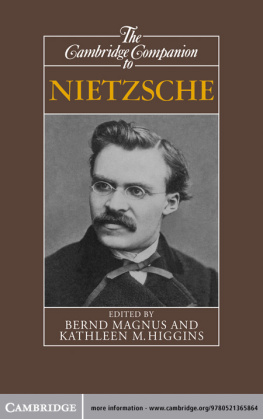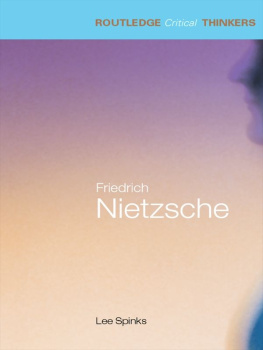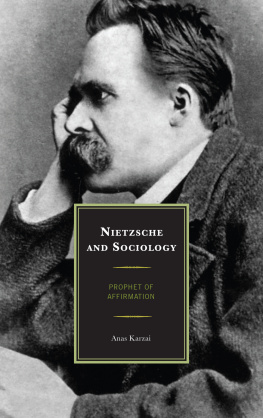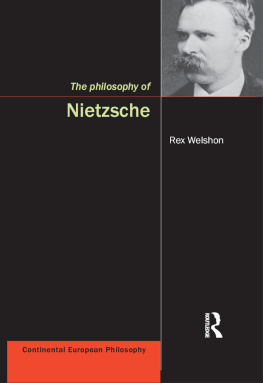The Affirmation of Life
The Affirmation of Life
BERNARD REGINSTER



To my father and the
memory of my mother
Preface
The present book develops a systematic interpretation of Nietzsche's ethical thought. I have relied on the critical edition of Nietzsche's works by Colli and Montinari, and I have referred to the still-classic translations of his works by Walter Kaufmann and R. J. Hollingdale, including, no doubt controversially, their collaborative translation of The Will to Power. I have done so on the assumption that these are the translations with which the reader is most likely to be familiar. However, I have also consulted some new translations, such as that of On the Genealogy of Morality by Maudemarie Clark and A. J. Swensen. In general, I have left those translations intact, occasionally reproducing the original German, except in a few cases in which I estimated that they were simply too misleading. For Kant and Schopenhauer, I have also used the classic translations, and relied on the standard Akademie edition of Kant's original works, and the Brockaus complete edition of Schopenhauer's original works. Here, too, I have remained largely faithful to the translations. I have indicated omissions of parts of the original text in all of my quotations with the convention "[ ... ]."
I gratefully acknowledge permission to reproduce the following of my already-published materials: parts of "Nietzsche on Ressentiment and Valuation" in Philosophy and Phenomenological Research 57 (June 1997), pp. 281-305, have been reproduced in Chapter 6; parts of "Happiness as a Faustian Bargain" in Daedalus 133 (2) (Spring 2004), pp. 52-59, have been used in Chapters 3 and 6; and parts of "Nihilism and the Affirmation of Life" in International Studies in Philosophy 34(3) (2002), pp. 55-68, have been used in Chapters 1 and 6.
Portions of this book were written under the auspices of the National Humanities Center, at which I was a fellow during spring 2000. I am deeply grateful for the support I received then. I have also, to varying degrees, incurred debts of gratitude to many colleagues, friends, and students during the conception and preparation of this book. They include, in alphabetical order, R. Lanier Anderson, Neera Badhwar, Akeel Bilgrami, Justin Broackes, Maudemarie Clark, Garrett Deckel, James Dreir, Jorge Fernandez, Harold Hodes, Robert Howell, Nadeem Hussain, Jonathan Ichikawa, George Kateb, Jaegwon Kim, Joshua Landy, Charles Larmore, Brian Leiter, Wolfgang Mann, Frederick Neuhouser, Martha Nussbaum, Robert Pippin, John Richardson, Matthias Risse, Ivan Soll, Richard Schacht, R. Jay Wallace, and Linda Zag- zebsky. I owe special thanks to Alexander Nehamas, who showed me the possibility of an interpretation of Nietzsche that is at once philosophical and distinctive, and to Robert Howell and Brian Leiter, who wrote detailed comments on the entire manuscript. It is in spite of the assistance of all mentioned here that this book remains marred by many shortcomings.
I have also benefited from discussions following presentations of parts of this book with audiences at Brown University, the University of Illinois at Champaign-Urbana, Stanford University, Cornell University, Wellesley College, the University of New Mexico, the University of Oklahoma, the Radcliffe Seminar at Harvard University, the Rhode Island Philosophical Society, the International Nietzsche Tagung in Naumburg, and the Nietzsche Kolleg at the Goethe-Schiller Stiftung at Weimar, and at various meetings of the North American Nietzsche Society.
Contents
Xi
Abbreviations
Primary sources from Nietzsche, Schopenhauer, and Kant are cited in the text by abbreviation and according to prevalent conventions.
WORKS BY NIETZSCHE
Nietzsche's works are cited by section number and, when applicable, by chapter as well: for example, On the Genealogy of Morals, chapter III, section 11 is cited as GM, III 11. In the case of Thus Spoke Zarathustra, I will also include within brackets the number of a subsection when applicable: for example, Z, III 12 [16]. Finally, I cite fragments from the posthumous notes in accordance to their classification in the Kritische Studienausgabe: for example, KSA 14 [453]. And I cite published texts from that edition by volume and page numbers: for example, KSA, I, pp. 783-792.

WORKS BY SCHOPENHAUER
Schopenhauer's works are cited by section number and, when applicable, by volume as well. Since the sections can be quite lengthy, I have also mentioned the translation's page number of the quotation: for example, The World as Will and Representation, volume I, section 57, p. 312 is cited as WWR, I 57, p. 312. Note that the chapters of the second volume of that work are numbered with roman numerals.

WORKS BY KANT
Kant's works are cited by page numbers from the so-called Akademie edition. For example, the Groundwork for a Metaphysics of Morals, Ak. p. 412 is cited as GW p. 412.


-WALLACE STEVENS, SUNDAY MORNING
Introduction
1. The Systematicity of Nietzsche's Thought
On November 13, 1888, a mere few weeks before his final collapse into insanity, Nietzsche makes the following announcement, in a letter to his friend Franz Overbeck: "The printing of Twilight of the Idols, or How to Philosophize with a Hammer is finished; the manuscript of Ecce Homo: How One Becomes What One Is is already at the printer's. The latter, an absolutely important book, gives some psychological and even biographical details about me and my writings; people will at last suddenly see me. The tone of the work, one of gay detachment fraught with a sense of destiny, as is everything I write. Then at the end of next year the first book of the revaluation will appear. It is finished."' Ecce Homo, the last original work Nietzsche was ever to complete,2 has all the trappings of an intellectual testament, from its title-"Ecce Homo" is an invitation to "behold the man" who is here presenting himself-to its content-Nietzsche reviews the nature and the significance of his intellectual contribution in a series of provocatively titled chapters ("Why I Am So Wise," "Why I Am So Clever," "Why I Write Such Good Books," and "Why I Am a Destiny"). This "absolutely important book" closes with a last, anxious plea for understanding: "Have I been understood?-Dionysus versus the Crucified.-" (EH, IV 9).
By that time, the figure of Dionysus has fully assumed the role of symbol for an ideal Nietzsche calls the "affirmation of life," whereas "the Crucified," an expression that traditionally refers to the Pauli nian conception of Christ, represents the opposite ideal of negation of life. The strategically significant location of these words unequivocally suggests, in my view, that Nietzsche regards the affirmation of life as his defining philosophical achievement. We truly "understand" him, he warns us, only insofar as we understand what the affirmation of life amounts to. Yet, in spite of the formidable literature on Nietzsche's work, we still lack an adequate and compelling account of both the nature and the significance of this notion in his philosophy. Moreover, the project of a "revaluation of all values," to which the letter also refers, and which will prove to be an essential requirement of the affirmation of life, has generated hardly less puzzlement and controversy.

